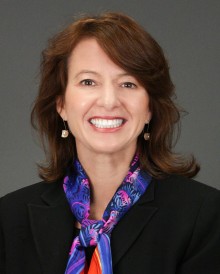
Kristin A. Bennett Ph.D.
Senior Counselor
Dr. Bennett works with clients to strengthen their scientific and technical projects so they deserve generous public support.
At the same time, Dr. Bennett has always understood that science can’t just be for scientists. She has led efforts to explain and popularize scientific research and breakthroughs.
“That’s one of my passions: energizing the public on science,” she said. “I love talking about science.”
Kristin A. Bennett, Ph.D., works with VSConsulting as a Senior Counselor to expand the firm’s work in nanotechnology, materials science, advanced instrumentation, physics, and the other high-tech scientific disciplines that will take the lead in the 21 st century.
With a background that ranges from personal involvement in the most sophisticated scientific research, to directing multi-million dollar projects, to government-wide research policy, Dr. Bennett understands the world of science, starting with some of the smallest particles known to humankind.
Dr. Bennett works with clients to strengthen their scientific and technical projects so they deserve generous public support. For instance, her management of the creation and operation of the Department of Energy’s Nanoscale Science Research Centers, valued at more than $480 million, demonstrates her skill in managing public money for worthy purposes.
At the same time, Dr. Bennett has always understood that science can’t just be for scientists. She has led efforts to explain and popularize scientific research and breakthroughs, through school and college programs, public speaking, and even an interactive Web-based tutorial on materials research called “Strange Matter.”
“That’s one of my passions: energizing the public on science,” she said. “I love talking about science.”
Among experiments of popular interest, she has bombarded the ax of a mummified Neolithic hunter with neutrons to learn about ancient weapons, used a particle accelerator to research the intricate organization of organic material in a sand dollar, and even replicated the frozen surface of Ganymede, one of Jupiter’s largest moons, to learn about ice formation on distant planets.
While nanotechnology, materials science, and neutron physics will continue to be technologies at the core of her work, Dr. Bennett foresees almost limitless opportunities for applying those disciplines to biomedicine and health care, energy production and conservation, defense-related work, and other critical areas.
“There is a thread through all of this, and that thread is materials science,” she said. “It’s all about the fundamental properties of matter and what makes up the universe.”
Before coming to Washington, Dr. Bennett had worked as a senior Program Manager for the Department of Energy’s Office of Science for six years. For the decade before that, she worked at the Los Alamos National Laboratory, advancing from postdoctoral fellow to the senior management of various projects.
Her final responsibilities with the Department of Energy included managing the incubation of new and promising applied and basic research programs. As such, she served as Manager of the DOE’s Experimental Program to Stimulate Competitive Research (EPSCoR), which seeks to expand research efforts more equally across the United States.
At Los Alamos National Laboratory, Dr. Bennett led the design, construction, and operations of HIPPO, a large state-of-the art machine to study materials by bombarding them with high-energy neutrons. HIPPO stands for High Pressure Preferred Orientation (neutron diffractometer).
Her success at Los Alamos brought her to the attention of the Department of Energy, where she managed development of Nanoscale Science Research Centers at Oak Ridge National Laboratory in Tennessee, Argonne National Laboratory in Illinois, and Brookhaven National Laboratory in New York.
“I jumped at the opportunity because it was a chance to go from managing a $4-million project to managing a program valued at more than $400 million,” she said.
In addition, Dr. Bennett managed the design and construction of advanced sensing instruments used in free-electron laser science.
Dr. Bennett represented DOE as a member of the U. S. National Science and Technology Council’s Subcommittee on Nanoscale Science, Engineering, and Technology for the National Nanotechnology Initiative. She is an invited editor for Nanotech Briefs Editorial Advisory Board.
She has published over 50 papers and conference proceedings on such topics as metal matrix composites, thin films, advanced engineering alloys, and artificial and naturally occurring materials.
Dr. Bennett earned her Ph.D. from the University of California at Berkeley in Geology and her Bachelor of Science in Mechanical Engineering from Trinity College. She was a Postdoctoral Fellow at the GeoForschungsZentrum in Potsdam, Germany, 1994-1995, and at Los Alamos National Laboratory, 1995-2002.
Dr. Bennett received the honors of Fellow at the University of California Institute of Geophysics and Planetary Physics, the Los Alamos Award of Excellence for significant contributions to the Stockpile Stewardship Program, the Los Alamos Certificate of Appreciation, along with the National Science Foundation’s “Women in Engineering” Fellowship.